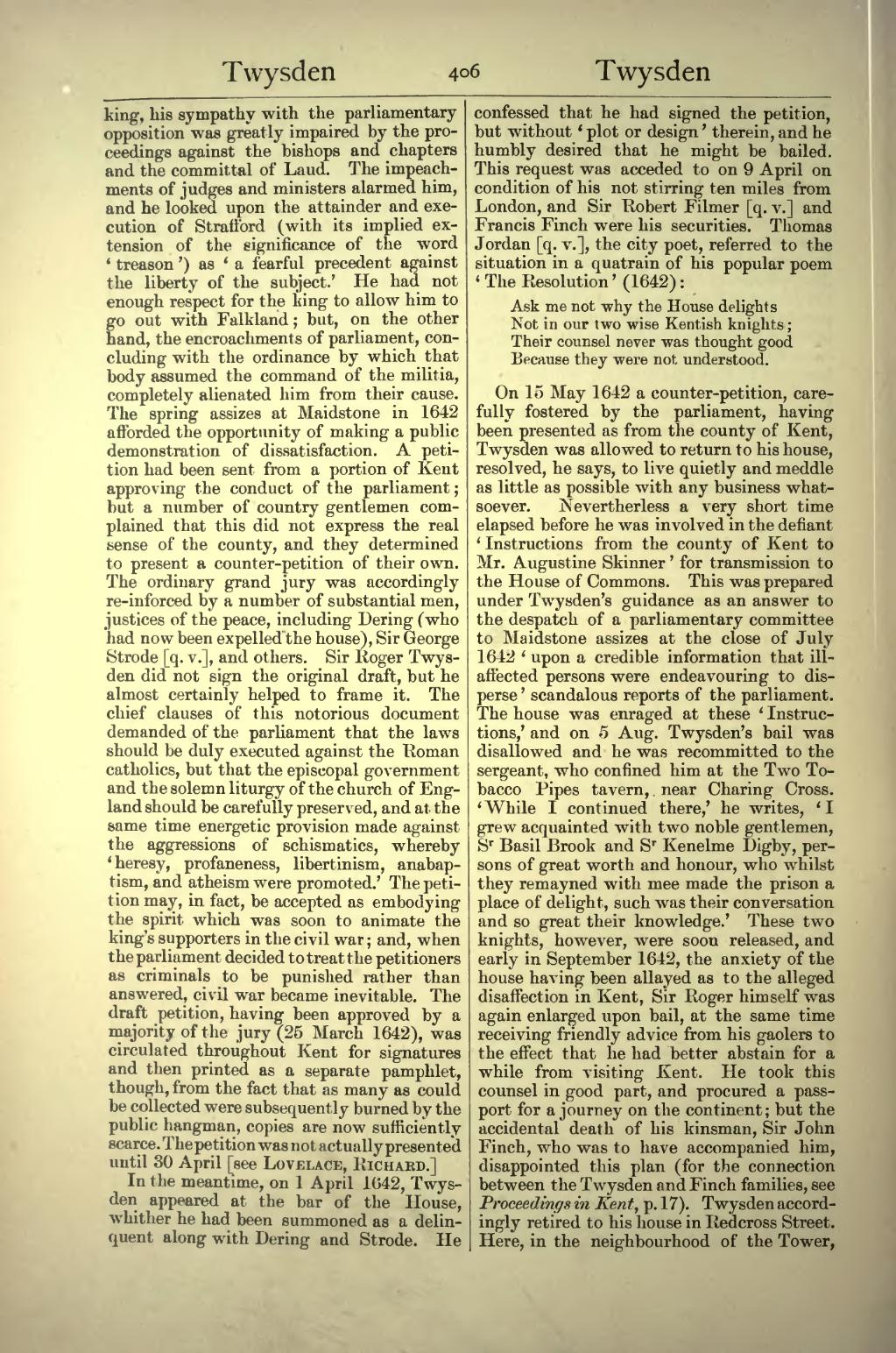king, his sympathy with the parliamentary opposition was greatly impaired by the proceedings against the bishops and chapters and the committal of Laud. The impeachments of judges and ministers alarmed him, and he looked upon the attainder and execution of Strafford (with its implied extension of the significance of the word ‘treason’) as ‘a fearful precedent against the liberty of the subject.’ He had not enough respect for the king to allow him to go out with Falkland; but, on the other hand, the encroachments of parliament, concluding with the ordinance by which that body assumed the command of the militia, completely alienated him from their cause. The spring assizes at Maidstone in 1642 afforded the opportunity of making a public demonstration of dissatisfaction. A petition had been sent from a portion of Kent approving the conduct of the parliament; but a number of country gentlemen complained that this did not express the real sense of the county, and they determined to present a counter-petition of their own. The ordinary grand jury was accordingly re-inforced by a number of substantial men, justices of the peace, including Dering (who had now been expelled the house), Sir George Strode [q. v.], and others. Sir Roger Twysden did not sign the original draft, but he almost certainly helped to frame it. The chief clauses of this notorious document demanded of the parliament that the laws should be duly executed against the Roman catholics, but that the episcopal government and the solemn liturgy of the church of England should be carefully preserved, and at the same time energetic provision made against the aggressions of schismatics, whereby ‘heresy, profaneness, libertinism, anabaptism, and atheism were promoted.’ The petition may, in fact, be accepted as embodying the spirit which was soon to animate the king's supporters in the civil war; and, when the parliament decided to treat the petitioners as criminals to be punished rather than answered, civil war became inevitable. The draft petition, having been approved by a majority of the jury (25 March 1642), was circulated throughout Kent for signatures and then printed as a separate pamphlet, though, from the fact that as many as could be collected were subsequently burned by the public hangman, copies are now sufficiently scarce. The petition was not actually presented until 30 April [see Lovelace.]
In the meantime, on 1 April 1642, Twysden appeared at the bar of the House, whither he had been summoned as a delinquent along with Dering and Strode. He confessed that he had signed the petition, but without ‘plot or design’ therein, and he humbly desired that he might be bailed. This request was acceded to on 9 April on condition of his not stirring ten miles from London, and Sir Robert Filmer [q. v.] and Francis Finch were his securities. Thomas Jordan [q. v.], the city poet, referred to the situation in a quatrain of his popular poem ‘The Resolution’ (1642):
Ask me not why the House delights
Not in our two wise Kentish knights;
Their counsel never was thought good
Because they were not understood.
On 15 May 1642 a counter-petition, carefully fostered by the parliament, having been presented as from the county of Kent, Twysden was allowed to return to his house, resolved, he says, to live quietly and meddle as little as possible with any business whatsoever. Nevertherless a very short time elapsed before he was involved in the defiant ‘Instructions from the county of Kent to Mr. Augustine Skinner’ for transmission to the House of Commons. This was prepared under Twysden's guidance as an answer to the despatch of a parliamentary committee to Maidstone assizes at the close of July 1642 ‘upon a credible information that ill-affected persons were endeavouring to disperse’ scandalous reports of the parliament. The house was enraged at these ‘Instructions,’ and on 5 Aug. Twysden's bail was disallowed and he was recommitted to the sergeant, who confined him at the Two Tobacco Pipes tavern, near Charing Cross. ‘While I continued there,’ he writes, ‘I grew acquainted with two noble gentlemen, Sr Basil Brook and Sr Kenelme Digby, persons of great worth and honour, who whilst they remayned with mee made the prison a place of delight, such was their conversation and so great their knowledge.’ These two knights, however, were soon released, and early in September 1642, the anxiety of the house having been allayed us to the alleged disaffection in Kent, Sir Roger himself was again enlarged upon bail, at the same time receiving friendly advice from his gaolers to the effect that he had better abstain for a while from visiting Kent. He took this counsel in good part, and procured a passport for a journey on the continent; but the accidental death of his kinsman, Sir John Finch, who was to have accompanied him, disappointed this plan (for the connection between the Twysden and Finch families, see Proceedings in Kent, p. 17). Twysden accordingly retired to his house in Redcross Street. Here, in the neighbourhood of the Tower,
